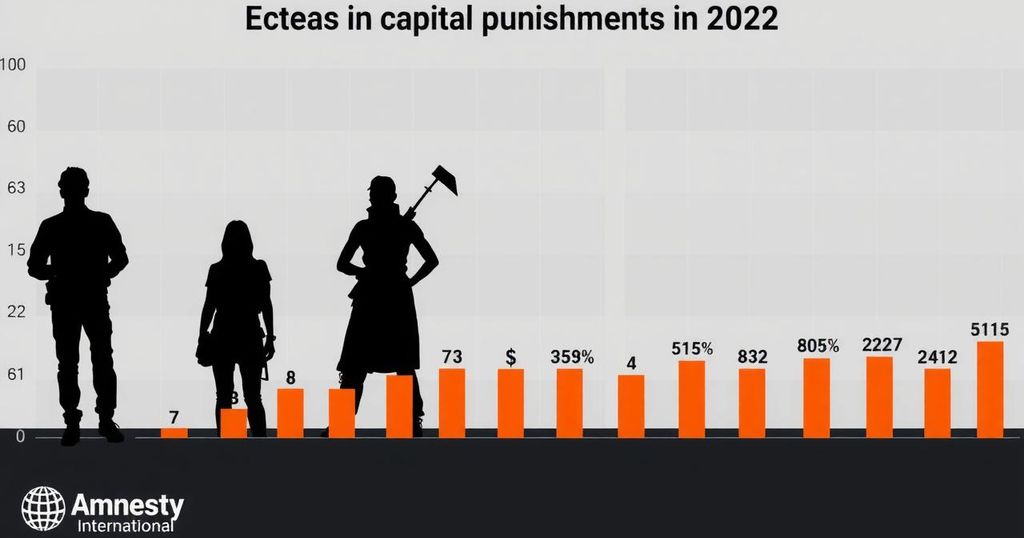Amnesty International’s report reveals a 53% increase in global executions in 2022, with significant rises in Iran and Saudi Arabia. The report highlights challenges in gathering accurate data, particularly from authoritarian regimes. Indonesia is criticized for its high number of death sentences, primarily for drug offenses. The trend raises concerns regarding the application of the death penalty for non-violent crimes, despite moves towards abolition in several countries.
According to Amnesty International’s annual report released on Tuesday, the number of executions across the globe surged by 53% in 2022 compared to the previous year. Notably, the report highlighted a marked increase in executions performed by Iran and Saudi Arabia. Amnesty International pointed out that 70% of executions in the Middle East and North Africa occurred in Iran, which experienced an 83% escalation in execution numbers from 314 in 2021 to 576 in 2022. Saudi Arabia also witnessed a dramatic rise, with executions tripling from 65 in 2021 to 196 in 2022. Furthermore, there were significant increases in execution rates in countries such as Kuwait, Myanmar, the Palestinian territories, Singapore, and the United States. Overall, executions in 2022 were documented in 20 nations, totaling 883 individuals compared to 579 in 18 countries in 2021. Amnesty International emphasized the challenges of obtaining accurate data on the death penalty due to secrecy and restrictive practices in nations like China, North Korea, and Vietnam. In Indonesia, the organization noted that 94% of the 112 new death sentences issued in 2022 were related to drug offenses, categorized as non-violent crimes under international standards. The report highlighted concerning statistics from Bangladesh, where at least 169 individuals received death sentences, the highest rate in the Asia-Pacific region, followed by India with 165 and Pakistan with 127. Indonesia maintains the death penalty for crimes including murder, terrorism, and drug trafficking, historically employing firing squads for executions. Last carried out in July 2016, Indonesia’s death penalty has over 450 inmates on death row, with convicted drug traffickers comprising around 60%, including 88 foreign nationals from multiple countries. The report revealed that China, Iran, Saudi Arabia, and Singapore executed at least 325 individuals for drug-related offenses in 2022, a figure more than double that of 2021. On a positive note, Amnesty International reported that the number of countries abolishing the death penalty reached 112 last year, including Papua New Guinea, Indonesia’s neighbor. Malaysia also began efforts to reform mandatory death sentences.
The topic of capital punishment remains a highly contentious issue globally, with divergent practices across different nations. Amnesty International provides an annual report detailing execution statistics and trends, underlining the plight of individuals facing the death penalty. Reports indicate significant discrepancies in the application of the death penalty, with certain countries employing it extensively for non-violent crimes, such as drug offenses. The persistent secrecy around execution figures in some authoritarian regimes complicates global assessments of the death penalty’s implementation.
In summary, the increase in global executions reported by Amnesty International marks a troubling trend, particularly highlighting the sharp rises in Iran and Saudi Arabia. The data indicates a worrying pattern of states relying on capital punishment, especially for offenses that do not meet the international threshold of ‘most serious crimes’. Despite growing movements toward abolition, with countries like Papua New Guinea leading the charge, the prevalence of the death penalty remains significant in various jurisdictions, posing ongoing ethical and human rights debates.
Original Source: www.pbs.org





